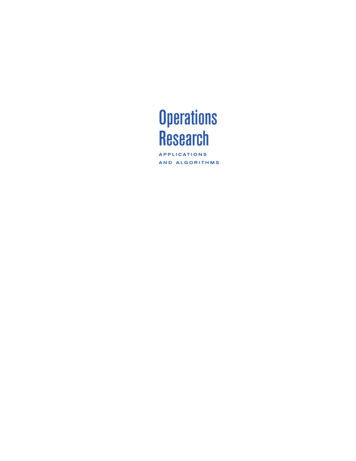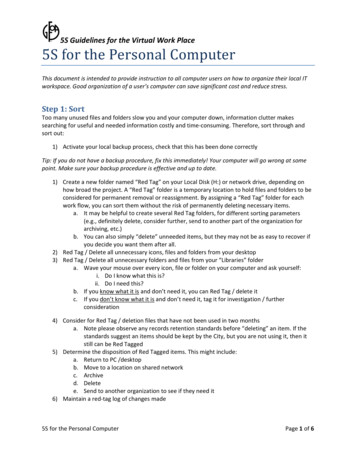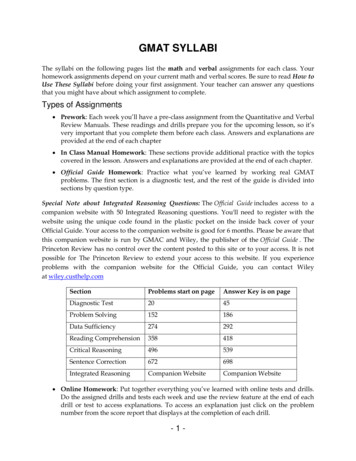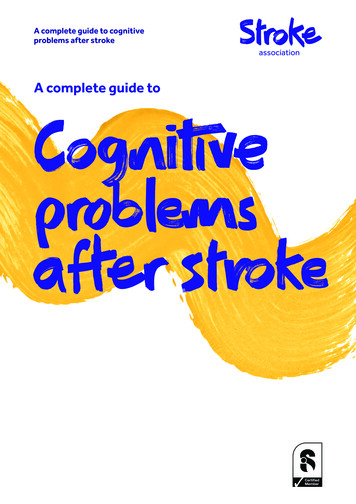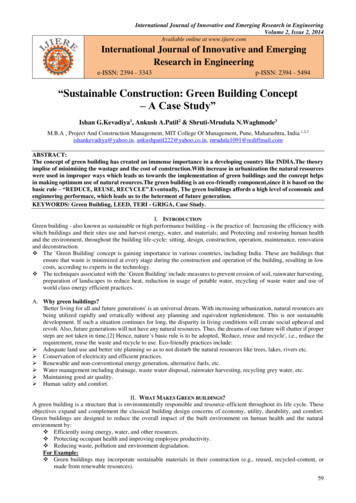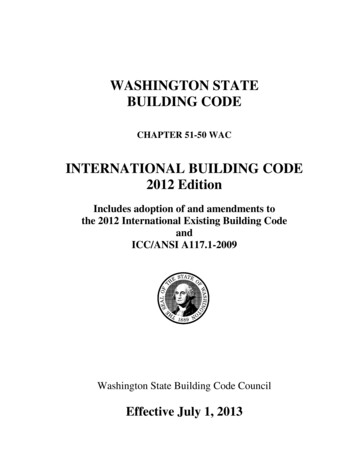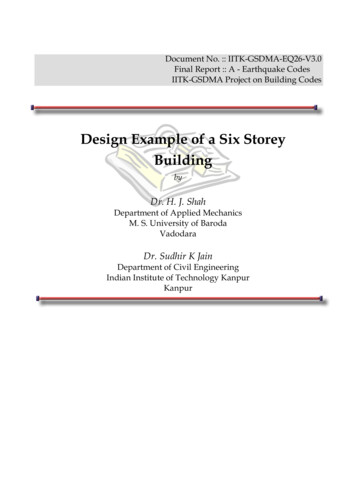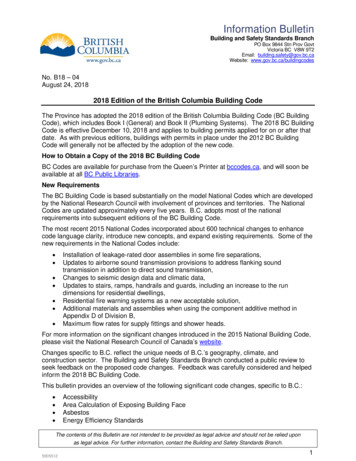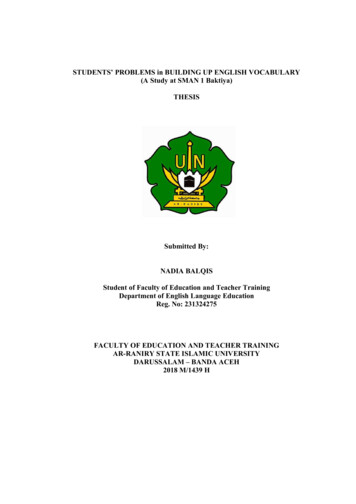
Transcription
STUDENTS’ PROBLEMS in BUILDING UP ENGLISH VOCABULARY(A Study at SMAN 1 Baktiya)THESISSubmitted By:NADIA BALQISStudent of Faculty of Education and Teacher TrainingDepartment of English Language EducationReg. No: 231324275FACULTY OF EDUCATION AND TEACHER TRAININGAR-RANIRY STATE ISLAMIC UNIVERSITYDARUSSALAM – BANDA ACEH2018 M/1439 H
ACKNOWLEDGMENTFirst and foremost, I would like to praise Allah, the almighty and the mostexalted God whose mercy and blessing have enable me to complete this thesis andmy bachelor program. Second, peace may be upon our prophet Muhammad SAW,who has guided us from the darkness to the most educated world.Furthermore, I greatly express thanks unaccountably to my father and mother,Muchtar and Siti Jamilah who always motivate me to reach the success. Then formy beloved sisters, Nurasiah, S.Pd, Halimatussa’diah, A.md, Keb., Suci Rahayu,Ainon Marziah, Elida hanum also for my brothers Muhammad Yunus andMuhammad Yusuf. I could not give all of myself to you. I am not a perfect sister,but love you all guys.Then, I would like to express my sincere gratitude to my beloved supervisors;Siti Khasinah, S.Ag, M.Pd and Dr. Phil. Saiful Akmal, S.Pd.I, M.A for supportingme throughout my thesis with the patience, insightful comments, and immenseknowledge. Their guidance helped me a lot unless this thesis would not have beencompleted. My appreciation is also addressed to the Head of English Departmentof Faculty of Tarbiyah and teacher Training Dr. T. Zulfikar, M. Ed, all lecturesand staff of English Department. Also, my special thanks for my super bestfriends; Rosita Rahmah and Yusnidar. For Safrizal Bayone, I thank you for beingmy brother, my friend also my candidat in the future life. Thank you so much foryour time and your patience.Finally, I realize this thesis is in need for the constructive ideas in order tofulfill its weakness. I hope it is useful for Vocabulary teaching in particular andEnglish Department of UIN Ar-Raniry and in education in Indonesia in general.Banda Aceh, February 8th, 2018Nadia Balqisi
CONTENTSAcknowledgment .Contents .List of Tables .Declaration Letter .Abstract .Chapter I: IntroductionA. Background of Study .B. Research Questions .C. Research Objective .D. Scope of Study .E. Research Significance .F. Terminology .Chapter II: Literature ReviewA. Definition of Vocabulary .B. Types of Vocabulary.C. The Strategy of Learning Vocabulary .D. Teaching English Vocabulary.E. Principles of Vocabulary Learning .F. Aspect of Vocabulary .G. The Importance of Mastering in Vocabulary Learning .H. The Problems of Learning Vocabulary.Chapter III: Research MethodologyA. Research Design .B. Research Location .C. Research Participant .D. Technique of Data Collection .E. Technique of Data Analysis.Chapter IV: Research Finding and DiscussionA. Research Finding .B. Discussion .Chapter V: Conclusion and SuggestionA. Conclusion .B. Suggestion.References 19242528292930343542464749
LIST OF TABLESTable 1.1. The Findings of Students’ Problems in Building Up EnglishVocabulary . 39Table 2.1.Students strategies in settling down the English vocabulary problems. 40iii
iv
ABSTRACTName: Nadia BalqisReg. No.: 231324275Advisor 1: Dr. phil. Saiful Akmal, M.AAdvisor 2: Siti Khasinah, M.PdTitle: Students’ Problems in Building Up English Vocabulary(A Study at SMAN 1 Baktiya)Key Words: Students’ problems, building up vocabulary.This research was carried out to find out and analyze the type of students’problems by the sophomore students of SMAN 1 Baktiya in building up Englishvocabulary and their strategy to overcome the problem. The researcher useddescriptive analysis method. Then, the data were collected through questionnaireand interview. Furthermore, the subject of this research is the sophomore studentsof SMAN 1 Baktiya which consisted of 60 students as the sample. The researchergave the 60 students a questionnaire that consisted of 15 questions of multiplechoices and interview two English teachers and six students. For teachers’interview consisted of 6 questions just as additional information. Finally, thefinding showed that there are two types of problem consisting of receptivevocabulary, such as listening and reading comprehension, and productivevocabulary, such as pronunciation correctly and use constructively in speakingand writing. The data also showed that there are many factors of students’problems in building up English vocabulary such as: word meaning, motivationand learning facilities and students’ laziness as the result the students having lessattention to the teachers.v
CHAPTER 1INTRODUCTIONA. Background Of StudyIn learning English, having a lot of vocabulary is very important. By usingseveral vocabulary, students will be able to use speaking and writing especiallyfor senior high students. Vocabulary poses a big or small problem for most of us.There are more than 750.000 words in the English language (James, 1994). Thereare obvious limits to human memory, however sharp it might be, in the case of asmall minory of people. It is not merely, therefore, the problem of remeberingsuch a vast vareity of words, but it is even a bigger problem to choose the rightword and to use it bewildering, and often seemingly endless variety of theirdenotations and connotations, and the various rules and shades of meaning thathave come to be associated with them. Knowledge of words is thus as importantas grammar. Ndomba (1983, P.26) also state that one of the big problems inlearning a language is a lot of difficult words, so that the students do notunderstand what they read. Only with mastering vocabulary they can read thecolumn of a newspapers or popular magazine or even understand news on theradio well to the information in improving their knowledge and their skill inmastering a foreign language.Mastering vocabulary is also the first step to master English well. We shouldensure that our students are aware of the vocabulary they need for their level andthat they can use the words which they want to use and/or the words we have1
2selected for them to use (Harmer, 1991, p.23). Therefore, the mastery ofvocabulary is an important tool to enable students to understand information orexplanation during teaching and learning process in education.In order to communicate by using English in oral and written forms, thestudents should prepare themselves with vocabulary mastery. According toThornbury (2002) without grammar, only view can be conveyed, and withoutvocabulary, nothing can be conveyed. Vocabulary mastery as one of languagecomponents will support the students in both oral and written communication. Thelack of vocabulary will influence their skill in developing ideas. It means, only bymastering words people can express their idea accurately. It would be impossiblefor one who does not have enough vocabulary to communicate his/her ideas asclearly as they want in oral written. The words that students choose in speakingwill affect how well they understand what the speaker says.However, someproblems have existed in almost all classrooms not only in junior school or seniorhigh school but also in university level that make the learners have lessvocabulary.The students will face some problems and difficulties in developing theirlanguage skill if they do not have enough vocabulary. Most Vietnamese learnersdo not want to take risks in applying what they have learnt, (Gnoinska, 1998,p.12). Students may recognize a word in a written or spoken form and think thatthey already "know the word", but they may not be able to use that word properlyin different contexts or pronounce it correctly.By mastering a lot of vocabulariesthey can communicate their ideas and they can grasp the transmitted ideas.
3Based on the researcher experience when doing field teaching practice(teaching practicum) at SMAN 1 Baktiya, the researcher found that most studentscould not build their vocabulary especially when they speak English. Eventhough, they have three English teachers who helped them in learning English.The teacher was support their students in learning English but only view changewhich they got. Besides, this school has been central in North Aceh District. Thestudents are not only from Baktiya, but also from rounding areas. Additionally,the location is not too far from the downtown, students’ address, and theireconomic background is relatively good. Also, this school has private class in theafternoon to facilitate conducive in English learning but the students still couldnot build English vocabulary in their daily life such as in speaking, listening,reading and writing.Speaking English is nothing without vocabulary. Mastering vocabulary is noteasy. Some students get bored to memorize the words. Thus, they will ignore whatthe teacher said. The teacher should motivate them in memorizing vocabulary andthey should find interesting way anymore to improve their vocabulary. Theteacher should prepare all the components in the teaching-learning process withthe purpose to build the student’s English vocabulary well. These mattersencourage the writer to explore more about this issue. Here, the problem that theresearcher most concern in this research is the way students build up their Englishvocabulary.
4B. Research QuestionsBased on the background of problems that have been described, the problemcould be formulated as follows:1.What are students’ problems in building up English vocabulary at SMAN 1Baktiya?2.How do students settle the problems in building up English vocabulary atSMAN 1 Baktiya?C. Research ObjectiveThe aims of this research are:1.To find out the difficulties faced by the students in building up Englishvocabulary at SMAN 1 Baktiya2.To find out how the students settle the problems in building up Englishvocabulary at SMAN 1 BaktiyaD. The Scope of StudyThis study is focused on the students’ problems and how they settle theproblems in building English vocabularyat SMAN 1 Baktiya. The subject of thisstudy is limited on how the students’ ability and their strategy in masteringvocabulary that appear in learning activities in the teaching-learning process.E. Research SignificanceThere are two research significances of this study, namely theoreticalsignificance and practical significance.
51.Theoretical significanceTheoretical significance of this study is to enrich a various references ortheories about teaching English in building up vocabulary. Here are the theoreticalsignificances of this research: Research finding hopefully can be used as an input and innovation inteaching English vocabulary. Research finding can be used as additional references for those who wantto conduct a research about building up English vocabulary.2.Practical significancePractically, this research also provides its significance as follows:a.Teachers The English teacher should be creative to manage and motivate thestudents in teaching English vocabulary by using modern and fun ways tobuild up students’ English vocabulary. Help other teacher to increase their effort in teaching English vocabularywhen they face the same situation.b. Students To help the students in understanding of the English vocabulary. Students will feel more confident to speak with good mastery of Englishvocabulary.
6c.Researcher The researcher expected that the study can increase the students’ Englishvocabulary in four skills, such as listening, speaking, reading and writingskill. The result of this research can be useful as references for the nextresearcher especially on the study of English vocabulary.F. TerminologyThere are terms used in this study and in order to avoid confusion andmisunderstanding, it is considered necessary to define them all as follows:1.Students’ ProblemStudents’ problem here means the difficulties that the students faced in theclassroom during teaching-learning process. Here the researcher found that therehave two factors make students difficult in learning English; individual factorsand social factors. The individual factors are the factors that come from thelearners themselves such as growth, aptitude, exercises, motivation and attitude.The social factors are the factors which come from surrounding the learners suchas family, teacher and teaching method, facilities, social motivation, (Syah, 2005,p.132). Thus, the researcher wants to know which aspects makes students’ hard inlearning English vocabulary and how they solve the problem also what theteachers’ response of this issue.
72.VocabularyIn terminology, vocabulary can be defined as a list of words for a particularlanguage or set of words that individual speaker of language might use (Hatch andBrown, 1995, p.1). Here, the researcher wants to define and limit vocabulary as anumber of words which is used for communication or to express the ideas and canbe found in dictionary. People who have vocabulary in their mind will be able totransfer knowledge easily. As we know, vocabulary has various types in Englishlanguage learning, there are; receptive vocabulary and expressive/productivevocabulary, listening vocabulary, speaking vocabulary, reading vocabulary andwriting vocabulary. Based on the types of vocabulary above, the researcher willbe focus on receptive vocabulary and expressive/productive vocabulary because itis included into four skills; listening, speaking, reading and writing.
CHAPTER IILITERATURE REVIEWThis chapter describes about definition of vocabulary, types of vocabulary,the strategy of learning vocabulary, teaching English vocabulary, principles ofvocabulary learning, aspect of vocabulary, the important of mastery vocabulary inlanguage learning and the problem of learning vocabulary.A. Definition of VocabularyVocabulary learning is an essential part in foreign language learning as themeanings of new words are very often emphasized, whether in books or inclassrooms. It is also central to language teaching and is of paramount importanceto a language learner. Recent research indicate that teaching vocabulary may beproblematic because many teachers are not confident about best practice invocabulary teaching and at times do not know where to begin to form aninstructional emphasis on word learning (Berne and Blachowicz, 2008).Vocabulary is an important aspect and very influential in mastering fourlanguage skills. Evelyn (2008, P.31) says that mastering language which isconsisted of speaking, listening, reading and writing ability depends on someone’svocabulary mastery. Vocabulary knowledge is often viewed as a critical tool forsecond language learners because a limited vocabulary in a second languageimpedes successful communication. Underscoring the importance of vocabulary8
9acquisition, Schmitt (2000) emphasizes that “lexical knowledge is central tocommunicative competence and to the acquisition of a second language” (p. 55).Learners of English have to deal with unfamiliar vocabulary during theirlanguage acquisition. In order to learn and retain new words, learners shouldparticipate in different task-based activities in their classroom whether it is aguessing task, a describing exercise or conversation making. Such activities alsoinclude vocabulary games which especially focus on helping learners develop anduse words in different contexts by making the lessons enjoyable.As cited inMaximo (2000) state many reasons for devoting attention to vocabulary. “First, alarge vocabulary is of course essential for mastery of a language. Second languageacquirers know this; they carry dictionaries with them, not grammar books, andregularly report that the lack of vocabulary is a major problem’’. Research hasshown that second language readers rely heavily on vocabulary knowledge andthe lack of that knowledge is the main and the largest obstacle for L2 readers toovercome (Huckin,1995).In production, when we have a meaning or concept that we wish to express,we need to have a store of words from which we can select to express thismeaning or concept.Vocabulary, in addition to grammar and pronunciation, is oneof language element considered necessary for language mastery. Vocabulary isdefined as all the words in a particular language (Wehmeier, et al., 2005, p.1707),whereas vocabulary teaching, as Furneaux (1999) states, deals with the selectionand presentation of words (lexis) for learners (p.367). Vocabulary teaching aimsat enabling learners to understand the concepts of unfamiliar words, gain a greater
10number of words, and use words successfully for communicative purposes. Thus,good vocabulary mastery supports mastery of each of the language skills, bothreceptive (listening and reading) and productive (speaking and writing).In other words, vocabulary is as a working tool which can help the learners tounderstand completely when they listen or read something. Harmer (1991,p.23)state that we should ensure that our students are aware of the vocabulary theyneed for their level and that they can use the words which they want to use and/orthe words we have selected for them to use. Therefore, the build of vocabulary isan important tool to enable students to understand information or explanation.The most vital aspects in building up a language are how to apply the wordsefficiently and correctly. This is the basic key for somebody who wants to learnlanguage successfully. Later on, vocabulary is one of important subject should bethought to the students who learn a foreign language. Because according toHarmer (1991, p.154), he state that for many years vocabulary was seen asincidental to the main purpose of language teaching – namely the acquisition ofgrammatical knowledge about the language. Vocabulary was necessary to givestudents something to hang on to when learning structure, but was frequently not amain focus for learning itself.Based on some definitions given above, it can be concluded that vocabularyis list of words which functioned as tool to communicate and it is used in writtenand spoken language. Vocabulary can help the students in building up the otherslanguage skills namely listening, speaking, reading and writing.It is clear enoughthat everybody who learns a language as a foreign language is hoped to know and
11master the vocabulary to improve the language skills. So when someone interestto learn foreign language they must master vocabulary well, because in alllanguage aspects vocabulary is needed.B. Types of VocabularyEnglish has an enormous spool of vocabulary. No one, even native speaker isable to know them all. Finitely, we do not need to know them all in order to useEnglish, we only need to know vocabulary those are relevant to our practicalpurpose. So from the user point of view, Quant (1997, P.103) said that it is usefulto distinguish at least four kind of vocabulary, they are:1.Listening vocabularyA person’s listening vocabulary is all the words he or she can recognize whenlistening to a speech. This vocabulary is aided in size by context and tone ofvoice.2.Speaking vocabularyA person’s speaking vocabulary is all the words he or she can use in speech.Due to the spontaneous nature of the speaking vocabulary, words are oftenmisused. This misuse-though slight and unintentional may be compensated byfacial expressions, tone of voice, or hands gestures. Secondary grade, we arereally referring to his meaning vocabulary.
123.Reading vocabularyA person’s reading vocabulary is all the words he or she can recognize whenreading. This is the largest types of vocabulary simply because it is included theother three.4.Writing vocabularyA person’s writing vocabulary is all the words he or she can employ inwriting. Contrary to the previous two types, the writing vocabulary is stimulatedby its user.Related to the distinguishing given by Quant above, Craft in his book entitledAn Introduction to English Language Teaching (1998, P.44) distinguishedvocabulary into two types, they are “There are words which the studentsunderstand, pronoun them correctly, and use them constructively in speaking andwriting, this type of vocabulary is called active vocabulary. The second one ispassive vocabulary, it is words that students recognize and understand when theyoccur in the context”.Some experts have classified types of vocabulary. Hatch & Brown (1995)classifies vocabulary into two kinds: a receptive vocabulary and expressivevocabulary (productive vocabulary).1.Receptive VocabularyReceptive vocabulary is words that the learners recognize and understandwhen they occur in context, but which cannot procedure correctly. It is vocabularythat they see in reading context but not use in speaking and writing. It is much
13larger than productive vocabulary because there are many words recognized whenthe student hears or reads but do not use when he speaks or writes. In theserespects, Richards and Rodgers (1998) give a profound explanation that thelistening vocabulary is larger than speaking vocabulary. Similarly, the readingvocabulary that is relatively larger than writing vocabulary.2.Expressive/Productive VocabularyProductive vocabulary is the words which students understand, canpronounce correctly and use constructively in speaking and writing. It involveswhat is needed for receptive vocabulary plus the ability to speak or write theappropriate time. Therefore, productive vocabulary can be addressed as an activeprocess, because the students can produce the words to express their thought toothers.From all previous explanation, it can be concluded that here are many kindsof vocabulary. Vocabulary is one of the important elements in building up andmastering a foreign language included English. It is impossible to express ourideas, emotion, feeling, and desire without having vocabulary. The masteringvocabulary becomes very essential for the students who learn a language as aforeign language.In addition, Jane (1990, P.115) added that vocabulary comprises twocategories, they are; (1) Words with specific meaning, e.g. pen, run, sleep. (2)Words with grammatical function, e.g. but, therefore, of, etc. It is necessary thatthe teacher of vocabulary subject has to know some characteristics of wordswhich will be presented to the students in vocabulary class. Firstly, the word
14being taught is the function of the word such as noun, verb, adjective, adverb,pronoun, etc. this is because some words having the same spelling and samepronunciation but they have different function. Secondly, there are many wordshave more than one meaning, the meaning of a word depends on its use such asface, like cost, etc.In relation to the same statement above, Dechant (1991, P.147) said that thereare some general principles that should guide the teacher in developing his / herstudents’ building up English vocabulary, they are:1) Words by themselves are not valid units of meaning. The meaning can noteby a word have been arbitrarily assigned to the symbol.2) Most words have more than one meaning.3) The specific meaning elicited by a word is a function of context.4) The number of meanings actually elicited by a word depends on the numberand quality of experiences that the reader has associated with the word. Eachnew level has experience with objective reality.Meaning of the words can be developing by using illustration clues,morphology analysis, context clues, and dictionary clues. From explanationabove, the researcher concluded that vocabulary is a very comprehensive part oflanguage that must be mastered by students who learned a foreign language. It isimpossible for them to master a foreign language without having and masteringvocabulary.
15C. Strategy of Learning VocabularyThe researcher provides in some strategies that have been proposed by theexperts. Hatch and Brown (1995) mention five essential steps in vocabularylearning that present what learners must to do as follows:1.Having sources for encountering new words. This step may be the firstimportant step in learning vocabulary. Without having sources, learning willbe ineffective.2.The second step is getting a clear image, either visual or auditory or both, forthe forms of the new words. Learners need the media assistance to ease theircomprehension in one vocabulary.3.Learning the meaning of the words is the most essential point in this step. Itshelp students to avoid misinterpreting in understanding the new vocabulary.4.Form and meaning must be related each other. That way, the learners need tomake strong memory connection between the form and meaning of the word.5.The last step is which is the main of all steps is using the words.D. Teaching English VocabularyThe process of teaching English Vocabulary is not easy to do like appear aswaste of time. Whereas, as previously argued, vocabulary mastery is the pathwayto mastering four paramount skills in English. According to Hornby (1995)defines teaching as giving instruction to somebody’s knowledge, skill, etc.Therefore, both teachers and learners should realize this and set aside destructivethoughts that motivate willingness to learn as much vocabulary as possible.
16Vocabulary is a central of English language acquisition, as according to Celceand Murcia (2001) vocabulary learning is a central to language acquisitionwhether the language is first, second, or foreign. Based on that explanation,teaching vocabulary is an activity where the teacher gives the students’knowledge about vocabulary and how to use it in daily life.E. The Principles of VocabularyIn learning vocabulary, of course the teacher and the learners must know theprinciples of vocabulary in learning a language. According to Kieran (2012)learning vocabulary has six principles, they are:1.Choose useful wordsTeacher should choose words that will be useful for her students to learn.Useful words are words that learners will meet very often, or need to use often intheir language use situations.2.Let the learners do the workFar too often, the teachers give the work for their learners by providingdefinitions, sentences. While helping students with difficult definitions isnecessary, it is probably more meaningful for learners to do work by themselves.It is aimed to set the students to learn the words by themselves first before takinga class.
173.Focus on different aspect of a wordThere are many words in English may have more than one meaning. Forexample the word ‘book’ obviously means something you use to read from (awritten work in the form of) a set of printed pages fastened together inside acover, as a thing to be read. But when come across word, then, and try to decipherits meaning we will have to look at the context in which it is used. The studentsalso should know word’s stresses, collocations, word family members,grammatical patterns, and also word parts. The learner can enrich their knowledgeof the words and perhaps they will remember it better by learning vocabulary,they can be encouraged to discover these different aspects of the words bythemselves.4.Provide meaningful learning opportunitiesIt is not enough only to inform the students the meaning of words or to teachthe students about the basic meaning of words. The students need opportunities tosee or hear the target of words in a meaningful context, and opportunities to usethe words in meaningful writing and speaking task. Challenging the students tofind these words in reading or listenig passages and use these words in particularwriting and speaking task is a simply way to provide students in meaningfullearning opportunities. The provision of these opportunities is also being as theimportant principle in learning vocabulary that should be considered byvocabulary teacher.
185.Implement a regular teasting scheduleIn achieving the target of teacing and learning vocabulary and to know thestudents’ progress, the students should be tested regularly. Teasting also can beused in giving students’ feedback on their success and failure in learning
In learning English, having a lot of vocabulary is very important. By using several vocabulary, students will be able to use speaking and writing especially for senior high students. Vocabulary poses a big or small problem for most of us. There are more than 750.000 words in t
